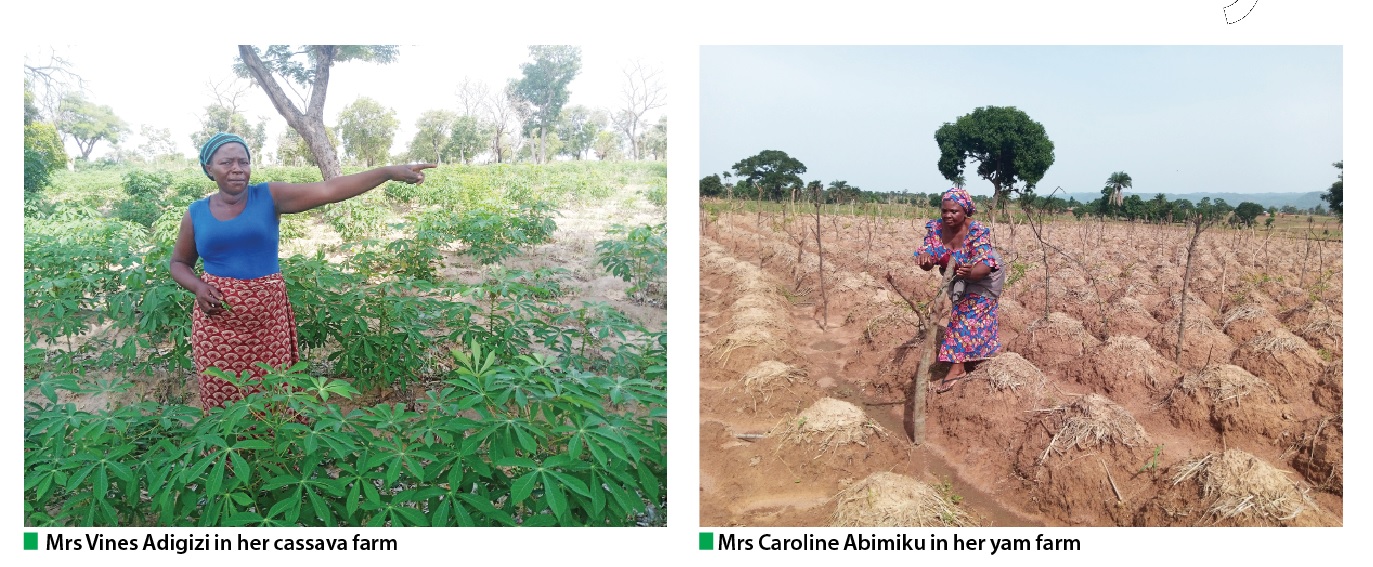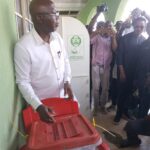Standing in the middle of her melon farm at Ikposoge village in Obi Local Government Area of Nasarawa State, Mrs Jumai Yohanna, 52, said her childhood dream was to marry a farmer. And she was happy her dream came true.
“Farming is in my blood. I was brought up in it,” she told our reporter as she expressed her passion for agriculture.
The grandmother of two, who has trained all her children in school with the income generated from farming, is now battling health challenges because she lost her crops and livestock worth millions of naira to communal crisis.
Asked how she fared as a farmer after the crisis, she said smallholder female farmers were not only marginalised, especially in support services, but neglected by the government despite having a gender policy which seeks to increase women and youth participation in agriculture.
“Please don’t remind me of those losses; I can start crying. It is part of the issues responsible for my sickness. I lost a lot of rice, sorghum, yams, melon and many goats,” she said, staring at their destroyed apartments, about 30 metres away from the farms.
When Mrs Yohanna lost her livestock and crops to farmers-herders crisis few years ago, she managed to start life afresh, but that was difficult because of the challenges of access to inputs.
She told our reporter that she struggles to buy certified seeds from the Nasarawa Agriculture Development Project (NADP), adding that lack of access to funds affects her ability to actively expand her farms.
“Sometimes we hear that government is distributing fertilisers, but if we go there, no one will give us. I have tried several times to get a loan, even after paying some money, without any success. I am not going to try again since one will not get it,” she said.
COVID-19 is further worsening the situation as it has destroyed market for the melon she stored to make little more money to aid her farming activities.
Like Jumai, many smallholder female farmers in other rural communities in Nasarawa State are in precarious situations as the measures taken to combat COVID-19, including restriction of movement and curfews, continue to affect them adversely.
Despite the Central Bank of Nigeria’s (CBN) creation of N50billion credit facility for poor households, as well as small and medium enterprises, and the provision of N1trillion in loans to boost local manufacturing and production across critical sectors, including agriculture, many of them said they did not benefit anything.
When our reporter visited some local government areas in the state, he also found women in dire situations because of the lockdown measures to control the spread of COVID-19, and the absence of farm inputs for the 2019/2020 wet season.
Their condition is further complicated by the shutdown of rural economy due to the closure of markets, restriction of movement across the state and the interstate lockdown.
With access to certified seeds, fertiliser, mechanisation and Federal Government’s palliatives becoming a major challenge, they expressed concern over likely poor harvest and how it might negatively affect their incomes since many of them are the breadwinners of their families.
Also, Mrs Suzan Godwin, who coordinates the Small Scale Women Farmers Organisation in Nigeria (SWOFON) in Nasarawa State, has a similar tale of sorrow. According to her, 17, 000 yams and other crops in the farm were destroyed during communal crisis, forcing her to move her family and farming activities to Andere at the outskirts of Lafia, along Doma-Lafia road.
The one-hectare land she currently cultivates in Andere is no longer fertile, so it needs a lot of fertiliser to support her groundnut and maize. But getting the commodity is a huge challenge for her and other women.
“Since I joined SWOFON in 2012, we have never benefitted from any assistance from government. We were hoping that something would happen this year when about 14,000 women across the state filled and submitted forms requesting government assistance in the area of fertilser, improved seeds and small machines like hand tillers. But the coming of this COVID-19 has taken the attention of government and they have forgotten that hunger is worse than the disease,” she said.
Mrs Godwin said she did not benefit from any of the Federal Government’s palliatives, such as food distribution to households and N50b to finance key sectors, as well as the Conditional Cash Transfer, particularly, the additional one million households( from 2.6 million to 3.6 million ) ordered by President Buhari to be included in the National Social Register.
“All these problems are because of lack of good seeds. If not so, this groundnut would have germinated better than this. Now, there is no fertiliser; this place (farm) is no more fertile. If one had support from government, at least one could expand the farm,” she said while walking round the farm.
She is finding it very difficult to rebuild her house in Tudun Adabu village.
At Aridi Usman, a village located about 25 killometres from Lafia, the Nasarawa State capital, Mrs Vines Adigizi, one of the many smallholder women farmers in the agrarian community, is suffering the same fate.
The 37-year old widow, who is battling to meet the needs of her three children (all boys) and an aged mother, cultivates cassava, yam, groundnut, rice, millet and beans.
Like the other women, Mrs Adigizi said she only heard that government supplied inputs, but she never benefitted. She is not even aware of any palliative by the Federal Government that targets smallholder farmers like her.
“The major problem I face is lack of fertiliser, good seeds, absence of small farm machines like hand tillers that we women can even control, as well as inadequate rainfall. That is why the groundnut and maize you see are looking somehow,” she said while walking our reporter through her farm.
Now, COVID-19 has made it even more difficult for her because trading in small grains is down in the state as buyers no long come due to restriction of movement.
Besides crop production, she has little investment in piggery, few broilers and one calf she is raising to sell during the yuletide season.
For Hannatu Umar, 45 and a mother of 10 in Keana Local Government Area, life has not been the same again since her rice farm was ravaged by flood last year. Before the flood, she harvested eight tonnes of rice, with which she comfortably paid her children’s school fees and that of the three orphans under her care.
This wet season, she cultivated maize and melon, and again, the farm has been flooded, leaving her in confusion.
“Seriously, we don’t get any help from the government. Last year, when flood destroyed our farms, government promised assistance. We went for workshops and held several meetings, but eight months now, nothing has happened. At a point, we felt that help was underway, but there was nothing at the end. Currently, I must confess to you that we are suffering. We are running here and there, trying to see where we can borrow money to go back to farm,” she lamented.
Since that flood disaster, she has been struggling to repay the Anchor Borrowers’ loan she took to cultivate rice. And despite the CBN’s three months moratorium, she said she was told to pay with three bags of rice, which she bought from the market.
What the women want
At the Galle area of Nasarawa-Eggon Local Government Area, Mrs Caroline Abimiku, said every smallholder farmer wanted to see positive things happen.
The 55-year-old farmer, who cultivates yam and maize, wants to see more aggressive support to stallholder female farmers across the country, especially in a period like this, adding, “All these palliatives they are talking about did not reach us.”
Mrs Abimiku also wants to see support in the area of small farm equipment, which the women can easily operate to reduce the cost of labour, which she said was taken so much from them. “We don’t have the energy to do everything. We have to pay people to work for us,” she added.
On access to land, she said, “Women find it very difficult to get access to land. A man has to stand in for you; and when they see that you are getting something significant, they will take it back from you.” She believes government can help in changing the perception of men in this regard.
We have committed resources to women in agric – Nasarawa gov’t
The Commissioner for Agriculture and Water Resources in Nasarawa State, Professor Otaki Alanana, told Daily Trust on Sunday that the state government was “irrevocably committed to agriculture.”
“Both men and women are involved in agriculture, and the Federal Government, as well as Nasarawa State, has really committed a little of its resources to women in agriculture,” Professor Alanana said.
This report was made possible with support from the International Budget Partnership (IBP).

 Join Daily Trust WhatsApp Community For Quick Access To News and Happenings Around You.
Join Daily Trust WhatsApp Community For Quick Access To News and Happenings Around You.


